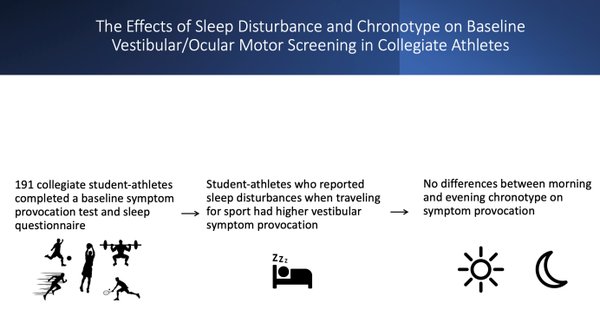-
Home
-
About JCTR
-
Gold Open Access
-
Issues
-
Editorial board
-
Author guidelines
-
Publication fees
-
Online first
-
Special issues
-
News
-
Publication ethics
-
Partners
-
Submit your manuscript
-
Submit your review report
-
Editorial Office
-

This work is licensed under a Creative Commons Attribution-NonCommercial 4.0 International License. ISSN print: 2382-6533 ISSN online: 2424-810X
Volume 8 Issue 6
The effects of sleep disturbance and chronotype on baseline vestibular/ocular motor screening in collegiate athletes
Bryan Crutcher*, Ryan N. Moran
Crutcher et al. J Clin Transl Res 2022; 8(6):18
Published online: November 28, 2022
Abstract
Background: The Vestibular/Ocular Motor Screening (VOMS) is a clinically validated screening tool for concussion management. Multiple factors have been known to influence VOMS performance such as preexisting migraine and mood disorders. Poor sleep is another important variable that warrants investigation as a modifier on the VOMS that may need to be considered during administration.
Aim: To examine whether self-reported sleep difficulties significantly modifies baseline VOMS symptom provocation in collegiate athletes.
Methods: 191 collegiate student-athletes completed a pre-season baseline VOMS and the 16-item Athlete Sleep Screening Questionnaire (ASSQ) prior to the start of their respective sport season. The ASSQ was used to establish sleep health variables consisting of hours of sleep per night, sleep difficulties when traveling for sport, chronotype (e.g., morning or evening person), and a sleep disturbance score (SDS) category of none, mild, moderate + severe.
Results: Those who reported sleep disturbances when traveling for sport on that respective ASSQ item had higher pre-test VOMS symptoms (p <.001) and symptom provocation on convergence (p=.015), horizontal vestibular ocular reflex (VOR) (p=.008), and vertical VOR (p=.039). There were worse pre-test symptoms (p= .015) and provocation on horizontal VOR (p = .046). in the moderate + severe SDS group than no SDS. The moderate + severe SDS group reported worse symptom provocation on the horizontal (p =.018) and vertical VOR (p=.010), and VMS (p=.017). No differences were found on VOMS symptom provocation for hours of sleep or chronotype.
Conclusions: These results show agreement with previous symptom and neurocognitive data in that sleep difficulties among collegiate athletes may have an important role in the interpretation of baseline concussion testing. It may be beneficial to utilize sleep assessments with baseline concussion testing when using the VOMS as the clinical concussion measurement modality.
Relevance for patients: The addition of sleep assessment may aid sports medicine practitioners in properly interpreting baseline VOMS scores. Pre-season baseline testing may need to be delayed if athletes report with poor sleep in the acute period prior.

DOI: http://dx.doi.org/10.18053/jctres.08.202206.018
Author affiliation
1. Colorado Christian University, Lakewood CO, United States of America
2. The University of Alabama, Tuscaloosa AL, United States of America
*Corresponding author
Bryan Crutcher
Colorado Christian University 277 Beckman Center, Lakewood, CO
Tel: +1 303 963 3116
Email: bcrutcher@ccu.edu
Handling editor:
Nicholas G Murray
Neuromechanics Laboratory, University of Nevada Reno School of Community Health Sciences, United States of America

